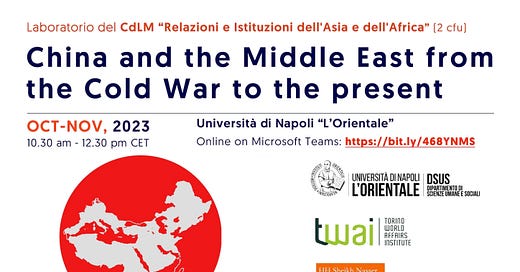PREAMBLE
On October 25, 2023, Professor Amjed Rasheed (Department of Security Studies, King’s College London), together with Professor Enrico Fardella, held an online seminar on Iraq’s strategy in the context of growing US-China competition as part of the China and the Middle East from the Cold War to the present seminar series organised by ChinaMed Project, c/o University of Torino
Lungodora Siena 100/a, Torino, Italy.
A summary of the presentation hereby:
Unlike Iran and Saudi Arabia, which possess active foreign policies that have led them to join the BRICS and play active roles in global politics, Iraq has so far not re-established itself internationally. In particular, for professor Rasheed, Baghdad has not yet been able to take a firm stance vis-à-vis the growing tensions between the US and China.
According to Rasheed, Iraqi policy towards Sino-American competition has been reactive and circumstantial rather than proactive and strategic, as Baghdad tries to balance between Beijing and Washington in the attempt to benefit from both. While China provides Iraq with support for its economic development, the US remains the country’s top security partner.
However, a factor behind Iraq’s ambivalence to rising international tensions is also its powerlessness due to the country being vulnerable both to the international system and from within.
International Challenges
For Rasheed, the Kuwait crisis (1990-91) marked the end of Iraq’s capacity to exercise international influence. Baghdad found itself grappling with sanctions and war reparations (until just last year, 5% of Iraqi oil revenue was allocated to compensate Kuwait). These economic hardships were compounded by the dissolution of the Soviet Union, the substantial debt accrued during the Iran-Iraq War (1980-88), and a sharp plunge in oil prices.
After the US invasion (2003), the UN sanction regime and the Oil-for-Food scheme were replaced by the Development Fund for Iraq. While Iraqi oil could be freely sold on the global market, all revenues would be first held in the US Federal Reserve Bank of New York. The funds would be then transferred to Iraq in cash by plane, each reportedly carrying half a billion USD (all costs related to transportation, insurance and protection are borne by Iraq).
Thus, despite its nominal independence, Iraq finds itself economically vulnerable. Its financial capacity is dependent on Washington, which retains the ability to reduce and freeze Baghdad’s access to its crucial oil revenues, constituting 90% of government income. This has occurred multiple times, limiting Iraq’s access to foreign exchange and forcing the Iraqi Central Bank to devalue the Iraqi dinar in order to stabilize the currency.
China’s Role
While the US remains Iraq’s primary security ally, in response to these economic issues, Baghdad has turned toward Beijing, which is now the country's main economic partner.
China has emerged as the biggest “winner” of the 2003 invasion, according to Rasheed. The geopolitical implications of the War on Terror, alongside Washington being bogged down in protracted conflicts and state-building efforts in Iraq and Afghanistan, has allowed Beijing to extend its global influence with little substantial opposition, in particular in Iraq.
In 2015, Beijing and Baghdad signed a strategic partnership for cooperation in areas such as energy, communication and infrastructure. As a result of this fruitful partnership, Iraq has become the largest recipient of the Belt and Road Initiative investment in the region, turning the country into the BRI’s third-most important partner after Pakistan and Russia. China also currently purchases 10% of its oil supply from Iraq (30% of Iraqi oil production).
Most of these investment and energy flows can be attributed to the China-Iraq “oil for construction” deal, signed in mid-2019 in the wake of the devastating war against Daesh (2013-2017). While the exact details of the agreement remain murky, it essentially involves Baghdad exchanging 100,000 barrels of oil per day for the services of Chinese construction companies. This arrangement, which effectively circumvents the need for cash transactions, has allowed Iraq to bypass US oversight concerning its oil sales and revenue. At the same time, it has been a massive source of corruption and controversy within Iraq.
Rasheed emphasized how Baghdad and many Iraqi people are not necessarily happy with economic reliance on China. Nevertheless, many Iraqis recognize that the People’s Republic is the only country willing to take the risk of investing in Iraq.
According to the professor, this Sino-Iraqi relationship is, however, rather one-sided, as Beijing seems to perceive Iraq as a lesser part of its greater Middle Eastern strategy. Indeed, despite the strong energy and economic relationship and the many visits of Iraqi Presidents and PMs to China over the years, Chinese President Xi Jinping has yet to visit Baghdad, seemingly preferring to take trips to Cairo, Riyadh and Tehran.
Domestic Issues
Baghdad’s capacity to address this challenging global context is hamstrung by its unstable and fragmented power-sharing-based political system. Moreover, Iraq is hampered by the existence of two foreign policies, a formal one managed by state institutions, and an informal one carried out by non-state actors, most notably the Popular Mobilization Forces (PMF).
The PMF are a coalition of predominantly Shia paramilitary groups mobilized in response to Daesh’s seizure of Mosul in June 2014. Despite their formal incorporation into Iraqi state security forces, they have been active beyond the country’s borders, including neighboring Syria and as far as Ukraine. Furthermore, much of the PMF remains closely tied with Iran, and as such often act to further Iranian interests in the region. Given the growing alignment between Tehran and Beijing, the PMF have adopted a more favorable stance toward Chinese investment and infrastructure projects in Iraq, complicating Baghdad’s task of establishing a coherent stance towards escalating Sino-American tensions.



